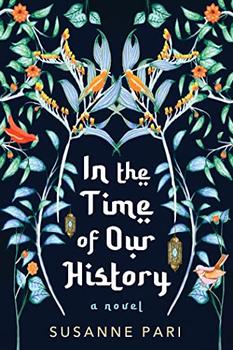Summary | Excerpt | Reading Guide | Reviews | Beyond the Book | Readalikes | Genres & Themes | Author Bio

Upstairs in the kitchen, she poured herself another glass of tea, very light, the color of American honey, so as not to risk the jitters that would surely make it impossible to apply her eyeliner smoothly. She resisted a piece of fattening halva and gathered a handful of white raisins to sweeten the tea in her mouth. In the family room, she sat in the middle of the long sofa and turned on the television. She jumped at the sudden loudness; Yusef's hearing was definitely going. She donned her reading glasses so she could see the markings on the remote control, then lowered the volume and found her channel: HGTV, a bathroom remodel—such marble! Ana sometimes used to come over and they would watch together, Ana with her yellow writing pad making lists of decorating ideas for her house; then they would go buy fabrics or paints or hardware—and once some castoff outdoor chairs—to work on at Ana's house, transforming areas large and small into what they had seen on the television.
Yusef rarely allowed Shireen to make any adjustments to their house that didn't involve professionals. It had always been like that. Before they moved to New Jersey almost forty years ago, Yusef and Shireen lived in Manhattan in the East Sixties in a two-bedroom apartment Yusef had begun renting in 1953, before he married Shireen, who came over from Iran three years later. Just remembering that place made Shireen roll her eyes and slap her cheek. Terrible. All big brown furniture smelling of pipe smoke. It had taken her a whole week after her arrival to work up the nerve to ask Yusef if they could use some of her dowry money for drapes to "complement" the Venetian blinds, and perhaps an understated quilted bedspread and maybe a set of drinking glasses that were not tinted a masculine gray. She was eighteen. He was thirty. The second time she'd laid eyes on him was on their wedding day (the first was when he came khastegari with his two aunts and she'd served tea as was expected of her when a suitor visited). To her redecorating requests, all Yusef had to say was no in a mild voice and the matter was closed. Luckily, Shireen became pregnant quickly. Still, Yusef insisted that the crib and changing table match the dark wood and bulgy style of the guest room headboard and bureau; nothing Shireen purchased, including the baby's layette from Bloomingdale's, was left to Shireen alone. This was Yusef's way, and Shireen told herself that she was fortunate to have a husband who cared so deeply for his home. Marriage could be much worse.
Mitra had spent her first year in that apartment. Shireen often thought this was why her eldest daughter preferred to live in cities and was unperturbed—actually lulled, it seemed—by the background noises of traffic and sirens. But Mitra's arrival had cluttered the second bedroom, and it became ever more difficult to accommodate friends and family who visited from Iran. And there were many, some who stayed for weeks to sightsee or shop or install their children in boarding schools and colleges. Yusef, as gracious and effusive a host as he was an aloof and restrained husband, finally proclaimed to his young wife that it was time to build a house.
Shireen pressed the remote for the Food Network. Another pasta dish. She sat back and sighed. Her nose was finally dry and clear; she felt her eyelids with the tips of her fingers; still a bit swollen. But no more crying, she ordered herself. It was always an effort. If Olga were here, she would help, tell a joke from her repertoire—about the cuckolded Rashti husband, about the miserly Turk, about the lecherous Arab—or she would shower Shireen with compliments, sitting cross-legged as always on the floor with her back against the sofa (despite Olga's more modern upbringing, she liked the floor as much as any servant), and state a case for Shireen's measured goodness as a mother, a wife, a friend, an employer, as if she were a vizier defending the virtues of a slandered empress at court. Shireen had drunk Olga's praise and respect like a suckling infant, but of course the quench was never permanent. Like a barren woman—like Olga and poor Mitra—Shireen couldn't make her own milk.
Excerpted from In the Time of Our History by Susanne Pari. Copyright © 2023 by Susanne Pari. Excerpted by permission of Kensington Publishing. All rights reserved. No part of this excerpt may be reproduced or reprinted without permission in writing from the publisher.




A million monkeys...
Click Here to find out who said this, as well as discovering other famous literary quotes!
Your guide toexceptional books
BookBrowse seeks out and recommends the best in contemporary fiction and nonfiction—books that not only engage and entertain but also deepen our understanding of ourselves and the world around us.